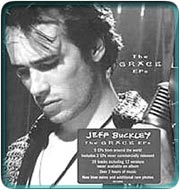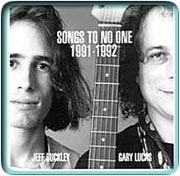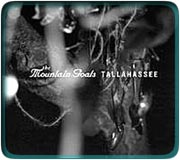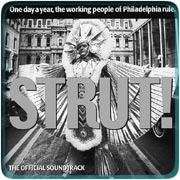






Also this issue: Disappearing Act suitespot Spork in the Road Palomar From Autumn to Ashes Unsilent Night KlezKamp Beat Box |
|||||||||
December 19-25, 2002
reviews
 |
The Mountain Goats
Tallahassee
Remember junior-year English, when you learned about Keats' "Ode on a Grecian Urn?" The poem's about a colorful vase on which is painted a boy about to kiss a girl. But the picture is a still life, of course, so the two will always be young and just a breath away from realizing their love, but locked in the joy of endless anticipation. Remember that? Well, Tallahassee is another kind of urn entirely. In these 14 songs, the boy and girl are married, bitter, vindictive people whom John Darnielle has captured just a dreaded breath away from something awful -- divorce, drinking themselves to death, maybe killing each other. These unfortunate souls (whom fans have dubbed the Alpha Couple after appearances in early Mountain Goats songs like "Alpha Incipiens" and "Alpha Desperation March") spend their Sisyphean eternity hurling hurtful things at each other like dishes in their Florida rancher: "I hope when you think of me years down the line/ You can't find one good thing to say." Or, more to the point, "I am drowning/ There is no sign of land/ You are coming down with me/ Hand in unlovable hand/ And I hope you die/ I hope we both die." Still, there are moments where you see glimmers of the sparks the two once felt for each other, and there's often enough humor and cleverness in the telling to keep the whole thing from coming off like a concept album. Tallahassee represents something of a wind change for Darnielle, marking not only The Mountain Goats' first foray into the big-time (OK, 4AD's not a major), but also the first full-band record from this typically one-man band. Songs like the concert favorite, "Oceanographer's Choice" -- a soulful standout track -- were recorded by Darnielle alone, then shipped off to Scotland where The Delgados added rock 'n' roll beats and some groovy backwards-guitar tricks. The effect, like the lyrics, is enthrallingly off-kilter. Occasionally you can tell Darnielle's not in the room with his new band, but (violently) ill communication is one of the record's most biting themes.
 |
At a time when alterna-audiences flock to lost Nirvana hits, my choice for most guileless angst-ridden icon is still Jeff Buckley. Somewhere between the laconic literacy of Leonard Cohen (whose "Hallelujah" Buckley essays with blinding angelicism), the lemon-squeeze howl of Robert Plant and Cobain's dreary theatricality was Buckley, a dream-croony art folkie who used halting rhythms and vaguely Middle Eastern guitar twists that suited post-grungers and aged rock crits alike. That he died recording a second official CD means there is only Grace, his beatific debut. Everything else is odds and sods. Like Buckley's pre-Grace collaboration with skronky guitarist Gary Lucas, a Captain Beefheart ex who formed Gods and Monsters before meeting Buckley at a church event in celebration of Buckley's jazz-folkie dad, Tim. Lucas made immediate moves to bring Buckley's holy syncopated howl to light. To suit Buckley's lovely dramatic swoon and elegiac lyrics, Lucas (on spartan duets "Hymne à l'Amour" and "How Long Will It Take") mixed his patented psychobabbling kitchen-sink scrawl with a flickering rhythmic twitch and an equally lovely elongated flutter. To this buoyant soundtrack, Buckley drifts and scats like Sam Cooke, singing about dreams and blunted desires with casual command. By their jazzy "Songs to No One," the mordant metal of "Cruel" and the descended-chord haste of "Grace," Buckley found his own patent: howling about souls aflame with delirium tremens and heartaching clarity atop enervated chords and torrid tom-toms. Unintended for release, No One is a magnificent precursor to what would become Grace and the five import EPs (of covers, rehearsal demos and gig soundboard clippings) that followed its 1994 release. Along with the empowered amazing gracefulness guiding the live codas of the dreamy "So Real" and "Grace," the seering Zep-like zealousness of "Mojo Pin" -- Grace's usual suspects -- there's a rickety 11-minute version of the seething, sexy "Tongue"' and more cover tunes than any Buckley freak could hope for (Hank Williams' "Lost Highway," Van Morrison's musky scattish "The Way Young Lovers Do" and the modulated tongue-speaking medley of Edith Piaf rear-ended by Buckley's own "Hymne"). If you're a Jeff freak, you'll want this. If you never knew Buckley's divinely informed power -- live or on record -- you'll need this.
 |
 |
For Keith Fullerton Whitman, time, space and patience seem to be the building blocks for music as much as effects pedals, laptops and guitars. Whitman's been kicking around the tone-and-drone crowd for some time (with Greg Davis and solo, as Hrvatski) and gained a bit of notoriety for his cover of "Paint it Black," but what has he done for us lately? Well, the slow-core stalwarts of all things hypnotic, Kranky, have released Playthroughs, an album that would do Eno, Riley, Reich and O'Rourke proud. With the help of tons of high-tech gadgetry, Whitman has produced a breathtaking variety of sound sculptures, but not one single song opting to go the bleep-blop route. Generally speaking, it's a played-out genre, and the kid down the street could crudely recreate the album's sound manipulations with just an iBook and an old Strat. But what makes this music and Playthroughs work is the thought and subtlety that can't be programmed.
 |
Max L. Raab has become a magnet magnate for all things Mummeresque. The producer/director's first documentary, currently hitting the East Coast film-fest circuit, has blossomed into a cinema-corp and a record label (Rittenhouse) whose first release is -- ta-da -- STRUT!'s soundtrack. The Mummers have a 250-plus-year history, and that banjo-filled noise -- a fabulously always-obvious roar -- is as definably Philadelphian as Lanza, Coltrane, Rundgren, Pendergrass or Brother JT. Rather than capture specific strums and brass blasts from Woodland or Durnington, one-man-band Anthony Newett is made to encapsulate the ragtime-y rhyme and reason of the string bands. It's a strange but apt approximation of the string band mien, a weirdly halting, bass-heavy and even bluesy adaptation of boozy Broad Street smashes that jar Henry Mancini's "Baby Elephant Walk" and Cy Coleman's "Join the Circus" to new life and turn Kid Ory's "Muskrat Ramble" into a Dixieland shuffle more funky than corny, which captures the tune's true spirit. While "Alabama Jubilee" and "Twelfth Street Rag" are overdone to Dewar's-soaked New Year's Day-perfection, other tracks -- the satin smooth ballad, "Do You Know What It Means to Miss New Orleans?", the sad, slippery "We'll Meet Again," Rodgers & Hart's "It Never Entered My Mind" -- are rare and surprisingly subtle for a music never known for being shy.






